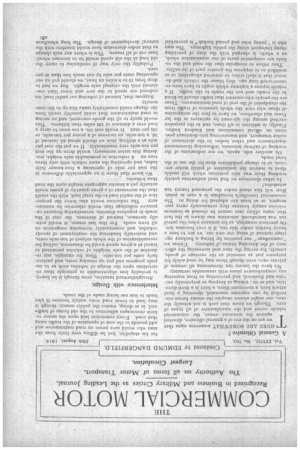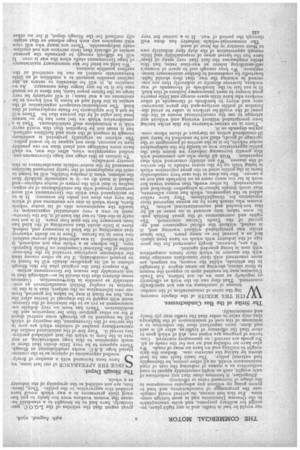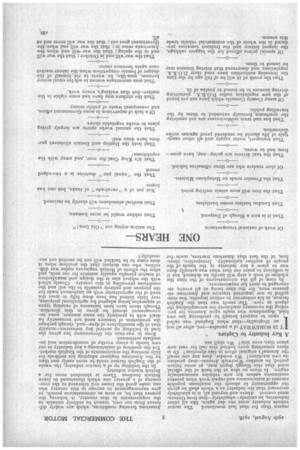A General Offensive ?
Page 1

Page 2

Page 3

If you've noticed an error in this article please click here to report it so we can fix it.
T . HERE ARE SOMEWHAT numerous signs that we are on the eve of a general offensive, directed against the motorcar owner, the cOmmercial . vehicle owner and the manufacturer of all types of cars. Though we know that such is not actually the case, one might almost imagine the enemy forces controlled by one supreme command, directing a local attack here, a movement there, a feint in a third direction, and so on ; aiming at keeping us perpetually nervous and flustered, and'preventing us from maturing any comprehensive plans with reasonable certainty.
We have the luxury tax threatening all owners of private cars, even thoughthese may be used solely for purposes just. as essential as the carriage of goods, namely, for saving the time and increasing the efficiency of the directing brains Of industry. Unless we "camouflage" our position by hiring a, hackney carsiege instead of using our own car, we are to bear a heavy burden under this tax, if it ever becomes law. On previous occasibns, as for instance when the petrol tax was introduced, attention was drawn to the fact that many utility oars cannot be classed as business vehicles simply because they occasionally carry passengers, or at least are adapted for doing so. The commercial traveller's brougham is a case in point. How will this stand under the proposed luxury tax schedules ? • In other directions wefind local authorities quietly working their way into positions which will enable them to restrict the institution of public motor services, or to charge prohibitive dues for the use of the local roads.
. On another side,again, we see indications of the working of railway interests, influencing Government departments and other bodies to the detriment of motor transport, and manceuvrieg into dominant positions on officialcommittees and kindred bodies. Finally, in addition to all these, and to the prejudice excited among the ignorant by agitators in the lay Press 'and elsewhere, we have to face the antagonism of .those who view the whole question of traffic from the standpoint of the cost of road Maintenance. These are the people who consider that traffic should he fitted to the roads; and not the roads to the traffic. If a -vehicleinjures a, highway which ought to have been reconstructed long ago, they blame the vehicle .and-demend that it shall either be removed altogether, or so modified as to suppress the greater part of itsntility.
They refuse to recognize that the road and the yehide are component parts of one organization which, as a whole, is charged with the duty of providing cheap tra,hsport along the public highways. The man who is " penny wise and pound foolish" is proverbial for his stupidity, but he differs very little from the man who would save pence on road maintenance and add pounds to the cost of operation of the traffic using that road. Every restriction laid upon the motor vehicle encourages adherence to the old forms of traffics and, in so doing, wastes the public money, though it may lead to lower road costs mainly because it also leads to less use being made of the roads.
Interference with Design.
Straightforward taxation, even though it be heavy, is probably less objectionable in principle than re-stricfions upon the design of vehicles such as to impede progress and put up running costs, and particularly costs per ton-mile. Thus, for example, any reduction of the axle weights of vehicles permitted to travel at a given speed would be disastrous, calling for reconsideration of the whole subject of ton-mile costs, and materially hindering the employment of speedy vehicles, and consequently increasing congestion on all town roads. For this last reason, it would actually increase, instead of decrease, the cost of the roads in populous districts, necessitating frequent expensive widenings that would otherwfse be unnecessary. The reduction would also lower the proportion of the useful load to the total load, with the result that the movement of a, given quantity of goods would actually put a, heavier aggregate weight upon the road than hitherto.
We know that there is no appreciable difference in the cost per mile of operating a four-tonner fully laden, and operating the same vehicle with only three tons up. A reduction in permissible axle weight, rendering this latter necessary, would drive up the cost per ton-mile very considerably_ If we put the cost per mile at a shilling, then we should spend 4d. instead of ad. a ton-mile, an increase of a penny per ton-mile, or 334 per cent. It would cost 10s. a ton more to carry a, load over a distance of 120 miles than hitherto. This would apply to all the goods conveyed, and no saying in road maintenance that could possibly result from the change could conceivably make this up to the community.
Suppose that, instead of reducing our useful load, we reduced our speed to the new and lower limit consistent with the original axle weight. Say we had to drop from 12 to 9 miles an hour, we should put up our operating costs per mile by not much less than 20 per cent.
Probably the only way of continuing to carry the old load at the old, speed would be to increase wheelbase out of all reason. This is where any such change as that under discussion here would interfere with the natural development Of design. The long wheelbase car would be bad in traffic, and in any tight place, unsuittal for military purposes and quite unacceptable in the Oversea Dominions and in most foreign countries. For this last reason, its arrival would complicate the programme of manufacturers and lead to prices going up wiThout any adequate recompense ia the shape of increased value or efficiency.
Altogether, it becomes clear that any reductions of axle weight, such as might conceivably appeal to road authorities as a means of reducing the cost of road maintenance would, on all other counts, be thoroughly bad national policy. The basic fault can be best shown by taking the extreme ease. Reduce the axle weight to nothing and we have no wear of roads. We also have no vehicles and no use for the roads at all. No goods are carried ; no passengers•conveyed. Centuries of progress are wiped out:, tall of which goes to show that the efficiency of traffic as after all is said and done, more important than the reduction to a minimum of the cost of maintenance of the highways that only exist in order that the traffic may ply freely • and economically.
The Strike of the Bus Conductresses.
WITH THE MERITS of the dispute concerning the rates of rennineration of the conductresses of omnibuses we are not specifically concerned. That they can do the work as efficiently or regularly as men we do not believe, but Trade Unionism may be counted upon to support the women in their claims, showing no mean degree if foresight in the attitude, whilstthe women, we suspect, are more concerned with dashimmediate earnings than with the manner in which their future competition with men is being guarded against.
We are, however, deeply concerned, for the prestige of the industry with which we have been identified as a journal for so many years. This latest strike was precipitated without warning and, it is stated, without the official cognizance and approval of the Trade Unions concerned. The rights and conveniences of the great British public were taken into account in no sense at all by this hot-headed and unconstitutional action. The women who struck have by no means improved their reputation for . thoughtfulness. They have rather added to the impression, Which has many adherents, that much female labour is altogether detached and uninterested. In other words, that woman treats her work hi far too many cases as an interlude and not as a career. She has done in this case liery considerable harm in the public mind to the great reputation which is being built nal by the motor vehicle in the service of the masses. We arc strictly concerned with that reputation. With all those who are aasociated with this greatly increasing industry we desire that the public appreciation won so hardly for the independent motor vehicle, be it in the service of passengers or the carriage of goods, shall not be smirched by hasty and ill considered action on the-part of those whose oecttwat ion depends on it: There no excuse swhatever for this stri
is having
been precipitated without warning and without any attempt to use the constitutional raesais at the disposal of the would-be strikers in order to avoid dislocation of public servicessand the grave inconvenience and worry to hundreds of thousands of other
• workers who have: little spare energy and little reserve good temper to meet unnecessary lonthers of this kind. It is not fair to the hundreds of thousands of war workers, however directly or indirectly they are concerned in winning the war, that they should lightheartedly be condemned to further unnecessary inconvenience. We hear enough and to spare of women's self-sacrificing. labour at war-time rates, but this strike emphasizes the ;fact that very many of them' have but the barest sense of responsibility and little enough appreciation of the duty they definitely owe to their country in its hour of need.
The comrnereia,l-vielaiele industry has done well through the period of war. It is a matter for very A.22 great regret that the vehicles of the L.G.O.C. particularly, have had to be brought to a standstill because the women workers were too hasty to put forward their grievances in a way which would have avoided this aggraaation to the public. They therefore, are not entitled to the sympathy of the industry as a whole. •
The Slough Depot.
SINCE THE APPEARANCE of our last issue, we have been favoured with a _number of firmlyworded expressions of opinion as to the contemplated huge A.S.C. works establishment at Slough. There appears to be very little doubt that there is. much opposition to this huge undertaking, at any rate in the form in which the last pubjished particulars reveal it. Very few of the uninitiated realize the extraordinary number of vehicles which are now in the service of the Government, the majority of which will be required to go through some central depot if for no other purpose than for inspection and demobilization. There has been no very definite announcement as yet as to the intention of the Government with regard to the disposal of lorries after the war, but we think it may be taken for granted, from our own information on the subject, that it is the ins , tention to employ British manufacturers as considerably as possible in this anonnection. Common sense dictates that this should be so—although that is not invariably the reason for Government action. We suspect that' the original plan for this Slough scheme in all its grandiose details will be found to be pruned considerably, if for no other reason than the wholesome scepticism revealed by the Sub-committee of the National Committee on Public Expenditure. _The scheme as a whole was not endorsed, it will be noticed. It was admitted that several authorities were in its favour. There is no doubt whatever that something of the kind is necessary and, indeed, there is little doubt that Something of the kind has been necessary for the past four years. It is not too early in the day, to say the least of it, for the Government to own a very substantial organization to handle the maintenance side of its motor vehicle fleets, fleets which in size are enormous and of which the very size does not make for economy. It is to be anticipated that while the Government will most certainly proceed with the establishment of an organization to deal with the return of motor vehicles—and indeed it must do so'---it is extremely unlikely that the scheme, when it reaches fruititn, will be found to omit, the employment of the vastly increased facilities possessed by the motor-vehicle manufacturers in this country nowadays.
To initiate at this stage any huge Government-controlled organization when, after the war, we shall have more buildings and plant than we can possibly turn to account, does not appear to be sound policy.. The 'scheme as originally projected is ambitious enough in respect of the area and facilities outlined, but it roust not be; forgotten that this would carry with it a tremendous staff establishment. That is a consideration which we feel sure has by no' means been lost sight of by the powers that be. There will be not a few applicants for State employment of -this kind. The mechanical-transport organization of the armies in the field and at home is. well known to be enormous on a war basis ; it will• large on the future peace basis, but there is no sound case for it to be any larger than necessary. As we conceive it, it will be desirable to return atathe earliest possible moment to a. condition of as little bureaucratic control as can be contrived at the earliest possible moment. We hold no brief for the unnecessary maintenance of huge Government staffs when the war is over. It will be difficult enough to !persuade the present armies of officials that their services are not continuously indispensable. There are many who will view with suspicion any such huge scheme -as that originally outlined for the Slough depot, if for no other
reason than for that last mentioned. The motor vehicle industry must one day again, like all other industries, be entirely—absolutely--free from Government control. Above and beyond all, it is absolutely necessary that the industry 'as a whole shall be given the opportunity to absorb the maximum poksible amount of maintenance and repair work when present continuous elders for new vehicles automatically expire. Is there no idea at the back of the official mind that this Slough depot may, at some future period, be another Woolwich Arsenal—may produce its own machines? We wonder, does any one recall the Arsenal's original effort in this direction? Or is there something more behind this call for vast new plant than even this? We shall see.
A Key Industry to Capture. •
T IS SOMEWHAT of a paradox—yet, after all not.
an illogicality—that when England was called upon to support herself by producing her own 1c M, dependence was made upon America for providing the necessary machinery for accomplishing the object in view. The result was that the English farmer, in his endeavour to reduce imports, was compelled to use imported tractors and American engineers were, for the time being at all events, encouraged to meet his requirements. In view. of all the circumstances of the time the wisdom of such a step will hardly be debated, but it is sufficient to...point out that what was actually done was to place a key industry in the hands of the people of another nationality. Irrespective, therefore, of the fact that American tractors, made 'for American farming conditions, which are widely different from our own, cannot be entirely suitable to the requirements in this country, it behove, the powers that be, so soon as circumstances permit, to give encouragement to anyone in this country who can make good the lesser evil tolerated in the overcoming of a greater one which threatened to leave Britain foodless. There is abundant room for a British tractor industry. In. the building up of a tractor industry, the wants of the English farmer could be more easily met than by the American engineer adapting his methods for fully meeting the requirements of the English market. Yet the question of maintaining a key industry in our own hands is alone worthy of consideration and immediate settlement.
Even in war-time the Government has given the lead in building up several key industries—notably that of tlie manufacture of dyes—and, though perhaps the production of tractors need not necessarily be dealt with in precisely the same manner, some encouragement should be given in this direction. Though there have been instances of existing types of apparatus,being adapted for agricultural purposes, very little indeed has been done fully to meet the need of the agriculturist with an implement made for the purpose and entirely suitable to the soil and the conditions prevailing in this country. Closely allied with the subject also is the design and manufacture of tractor ploughs equally suitable for our soils, and after the efforts of British engineers under war difficulties, who can despair that the problem when it does come to be tackled will not be carried out successfully1






















